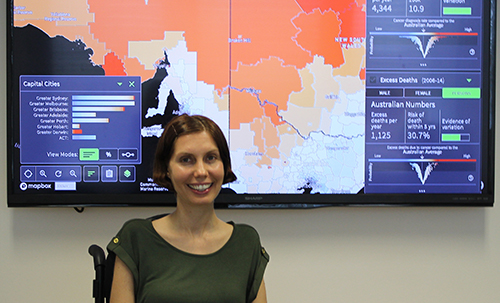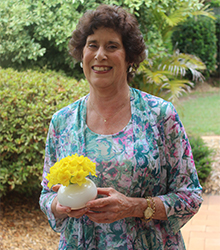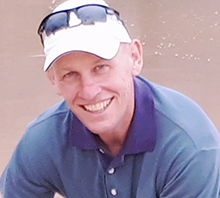On this page you will find information on:
Welcome
Happy New Year and welcome to the fourth edition of our Friends of CCQ newsletter!
2018 was a great year for us at Cancer Council Queensland. I feel very proud of what was achieved and very appreciative of the hard work put in by employees, volunteers and supporters.
Wonderful outcomes are only made possible due to the efforts of each person at CCQ and the spirit in which we work together. It’s through our collective impact that we make the greatest difference.
We started off January on a high with the news that Dr Susanna Cramb, Spatial Modeller from our Descriptive Epidemiology team has been named one of the 2019/2020 Superstars of STEM by Science and Technology Australia (STA). Entry into the program is highly competitive and she will spend the next two years undertaking activities that aim to remove society’s gender assumptions about scientists and increase the public visibility of women in STEM.
I’m looking forward to sharing more exciting updates with you throughout the year and continuing our amazing progress.
With thanks
Chris McMillan
Chief Executive Officer
Spacial modeller named a Superstar of STEM
Cancer Council Queensland spatial modeller Dr Susanna Cramb has been named a Superstar of STEM by Science & Technology Australia (STA).
Entry into the program is highly competitive, with only 60 scientists chosen from around Australia.
Dr Cramb will spend the next two years undertaking activities that aim to remove society’s gender assumptions about scientists and increase the public visibility of women in STEM.
She said her experience earlier this year speaking at a girls’ maths day at the University of New Wales motivated her to apply to become a Superstar of STEM.

“I really enjoyed speaking to 600 young women who are in senior high school and encouraging them to consider a career in statistics. It made me realise I have the potential to be a role model for students and could promote the importance of women in STEM,” Dr Cramb said.
In addition to working within Cancer Council Queensland’s research team, Dr Cramb is an adjunct visiting fellow with QUT.
She was a key member of the team behind the recent release of an Australian Atlas of Cancer – the interactive digital cancer atlas shows national patterns in cancer incidence and survival rates based on where people live for 20 of the most common cancers in Australia.
“It’s hard to see if there’s a problem in an area without getting the data and running some analyses. So we’re able to see clearly what is happening in this country when it comes to cancer, and identify where things potentially need to be improved,” Dr Cramb said.
Professor Emma Johnston AO, President of Science & Technology Australia, said the 60 women announced today would no longer be hiding their scientific superpowers, and would share them with as many Australians as possible following the launch.
“When we launched the program last year, I said that the stereotypical scientists was an old man in a white coat,” Professor Johnston said.
“Thanks to the first 30 Superstars this is starting to change, and with 60 more announced today, we will be well on our way to permanently smashing the stereotype.”
For Dr Cramb, her superpower is statistics. She wants to show that in addition to her work with the Atlas of Cancer, stats can be used to make a difference in so many different areas.
“Data is everywhere, but without statistics and knowing how to interpret that data, we won’t have a chance to make use of all that information. Statistics are valuable in almost any discipline, whatever someone’s interest is in, they can merge that with statistics to have an impact,” she said.
Dr Cramb sees the importance of communicating her research, and believes all scientists should see that as a priority.
“Any scientist needs strong communications skills. If you can get your message across to audiences, that’s when they can see how amazing science is. So I am hoping to improve my communications skills through the Superstars program,” she said.
For more information on the Superstars of STEM program, visit scienceandtechnologyaustralia.org.au.
Your beautiful legacy
“I’m not a wealthy woman, but I want to leave what I can.”
“I just want to help with the research and supporting cancer patients and their families. That takes money.” Rebecca Bell, Cancer Council Queensland volunteer
Rebecca Bell has volunteered her time for years with Cancer Council Queensland.
Now, she wants to do even more.

“I’ve been a cancer carer and support person since I was seven years old … My own dad had prostate cancer with secondary cancers,” says Rebecca Bell.
“I’m not a wealthy woman, but I want to leave what I can toward the work, because it’s getting so exciting with the research that’s making lives easier for people that are going through cancer.”
Rebecca is inspired by the way research has changed the face of treatment dramatically since she lost a good friend in high school more than 50 years ago.
“It just gets me excited to know that other people that who are 14, 15, now have much more hope of survival and a good life to look forward to because of cancer research.”
Most of all, she says, the legacy she wants to leave is kindness.
“The legacy I want to leave is kindness”
A gift in your Will to Cancer Council Queensland is a lasting legacy that provides hope for a cancer free future. Through your Will, you can help fund lifesaving cancer research and support services for patients and their families.
For more information, please call 1300 66 39 36 or email philiphancock@cancerqld.org.au
Meet our people – Danny Youlden
Welcome to meet our people, our regular post highlighting the people who make CCQ the great place it is. We’ll bring you frequent profiles so you can get to know everyone from Cairns to Southport. This week we have Danny Youlden, our inspiring and ever so knowledgeable Senior Manager from The Childhood Cancer Research Team.
Name: Danny Youlden
Role: Senior Manager, Childhood Cancer Research

How would you describe your job to someone in a different field / not familiar with Cancer Council Queensland? My primary role is to analyse and report on data that is collected in the Australian Childhood Cancer Registry, which stores details on every child in the country who has been diagnosed with cancer since 1983. The purpose of my job is to give people a better understanding of these rare but significant diseases, provide information that can be used for advocacy and increasing awareness, and ultimately to improve outcomes for patients.
My favourite hobby is: Golf. I don’t play regularly and I’m not very good at it, but golf courses are very nice places to walk around and there is often that one incredible shot that brings you back the next time.
A skill I wish I had: I would love to have a lot more natural musical ability than I do (i.e. almost zero).
Guilty pleasure: I have a weakness for desserts, but I usually don’t feel too guilty about it until I get on the scales, look in the mirror or have to answer a survey from the Healthy Workplace Committee!
What I enjoy most about my role at Cancer Council Queensland is: Having the opportunity to collaborate on a variety of research studies with some very knowledgeable and dedicated people who are great to work with and from whom I have learned a great deal over the last few years. There is always a sense of accomplishment that comes with getting our findings published.
My pet hate is: I checked with our dog Monty. He said that he is not all that fond of storms. I can’t agree with him on that one – I always look forward to a bit of lightning and thunder.
My hidden talent is: I’m quite good at packing things into whatever space is available. I was even complimented once by someone at airport security for my neatly arranged suitcase.
If I could change careers I would: Work with animals – maybe helping to train guide dogs or a job at Australia Zoo (preferably in the marsupial section rather than the Crocoseum).
My worst habit is: Plenty to choose from – I’ll go with something on the safe side and say that I can be a touch pedantic at times.
I’m most proud of: Being part of an organisation that offers people assistance and hope during one of the most difficult periods in their lives.
Best advice I ever got: Do unto others as you would have them do unto you.
Year started at Cancer Council Queensland: 2005
What three traits would you describe yourself with? If I can choose three positive traits I would say reliable, honest and generous, but I would also have to balance that out by admitting to a few negative ones as well, particularly the fact that I am impatient.
Most memorable moment at Cancer Council Queensland: Helping to develop a comprehensive set of rules for cancer registries to assign stage at diagnosis for childhood cancers. I’m still amazed that a document developed and tested over many months right here at CCQ has been translated into several languages and is now being used throughout the world, including places such as Europe, South America and Africa.
Is there someone that inspires you? People that devote themselves to serving others.
Australian Cancer Atlas unpacks cancer burden by locality
Australians can now discover the impact of cancer in their suburb or town, with the launch of a new cutting-edge Australian Cancer Atlas.
The interactive digital cancer atlas shows national patterns in cancer incidence and survival rates based on where people live for 20 of the most common cancers in Australia – such as lung, breast and bowel cancer – likely reflecting the characteristics, lifestyles and access to health services in the area.
This world-leading project, led by researchers from Cancer Council Queensland, Queensland University of Technology (QUT) and FrontierSI, will give health agencies and policy makers a better understanding of geographic disparities and health requirements across the country.
Cancer Council Queensland CEO, Ms Chris McMillan, said the charity was proud to launch the Australian Cancer Atlas in an effort to advance cancer control nationally.
“This project builds on years of work by Cancer Council Queensland to better understand the cancer divide between metropolitan and rural areas, and map the gaps linked to socio-economic status and other demographic factors,” Ms McMillan said.
“In 2018 an estimated 138,000 Australians will be diagnosed with cancer, but we know that some people face greater risks of diagnosis and death than others, due to a mix of lifestyle characteristics, behaviour, genetics and other unknown factors.
“The atlas enables readers to easily visualise those differences and offers critical insight into patterns of cancer and outcomes in Australia, depending on where people live, which can be used to drive research and policies going forward.”
Cancer Council Queensland Head of Research, Professor Joanne Aitken, said the digital atlas highlighted which geographical areas had cancer rates below or above the national average.
“Australians can filter down to look at the impact of various types of cancer in the region where they live, to understand cancer patterns across the country. However, it’s important to remember that local cancer trends won’t necessarily reflect your own cancer risk,” Prof Aitken said.
“Cancer rates vary across geographic regions depending on things like the age of local residents, participation in screening programs and trends in terms of cancer risk behaviours.
“Regardless of what is happening in our local area – we should each feel empowered to reduce our cancer risk by not smoking, being SunSmart, maintaining a healthy weight, reducing alcohol intake, exercising regularly, eating a healthy diet and getting checked.
“One of the most revealing patterns in the atlas was the severe disparities in Australia with liver cancer, with incidence rates significantly higher than the national average in many areas in Northern Australia and many metropolitan areas of Sydney and Melbourne, due to differences in the distribution of known risk factors such as hepatitis, intravenous drugs use and excess alcohol consumption.
“In addition, other findings confirm that melanoma incidence rates are higher than the Australian average in many areas of Queensland and northern New South Wales.”
Cancer Council Queensland Senior Research Fellow, Professor Peter Baade said excess death rates for many cancers continued to be higher in rural and remote areas of the country.
“There is still a long way to go to understand the reasons for all the geographic disparities but the atlas is designed to motivate and accelerate the pace of targeted research in areas that need it the most,” he said.
The estimates within the Australian Cancer Atlas were calculated using sophisticated statistical models and spatial analyses, developed by statisticians from QUT and Cancer Council Queensland, using data from each from the Australian state and territory Cancer Council registries.
The online atlas is powered by myGlobe, a state-of-the-art digital system that has been developed and enhanced specifically for the atlas by the Visualisation and eResearch team at QUT.
Distinguished Professor of Statistics at QUT and Deputy Director of the ARC Centre of Excellence for Mathematical and Statistical Frontiers (ACEMS), Professor Kerrie Mengersen said the atlas was designed to be user-friendly, with robust information and innovative visual presentations to help people interpret and understand the statistics.
“It can be added to and updated regularly so that all Australians can have access to the latest available information,” Prof Mengersen said.
“This project has been an exciting and rewarding one to work on, to build statistical models from the registry data gathered and to present this information in an easy-to-navigate, interactive tool.
“We believe the atlas will be an important resource, of benefit to all Australians, and hope it will drive policy and research so that we eliminate disparities across Australia in levels of cancer care, resourcing and survival.”
FrontierSI CEO Dr Graeme Kernich said the atlas has been a great success story in bringing together Cancer Council registries, universities, health departments and the Australian Institute of Health and Welfare to deliver an exceptional resource.
“This was an Australia-wide project linking different data sets to simply and seamlessly visualise the effects of cancer on our population through a spatial lens,” Dr Kernich said.
“It is promising for many areas of our digital economy just how well the team traversed the intersection of government and academia to deliver such an important piece of infrastructure.
“The online atlas visually tells a complex story simply, for anyone to explore.”
The Australian Cancer Atlas is a collaborative project developed by statisticians, cancer researchers, visualisation experts and IT specialists from Cancer Council Queensland, QUT and representatives from the Australian Institute of Health and Welfare, with additional input from government, community members, consumers and the media. The atlas has been endorsed by the Australasian Association of Cancer Registries and Cancer Council Australia, and investigators access expertise from the Australian Research Council (ARC) Centre of Excellence for Mathematical and Statistical Frontiers (ACEMS).
Explore the atlas at atlas.cancer.org.au.
